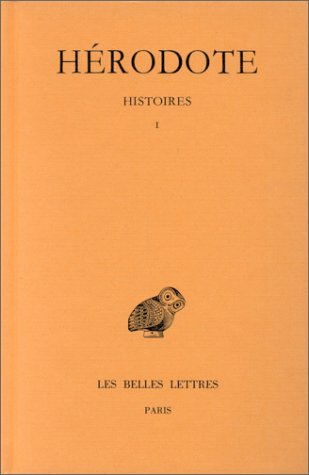
Part of Series
Comme il hésitait à entrer en conflit avec Cyrus, Crésus, roi de Lydie, consulte l’oracle qui l’assure de la fin d’un grand empire. Par la suite, pieds et poings liés sur le bûcher destiné au vaincu, Crésus comprend, un peu tard, que l’empire voué à la catastrophe était le sien. L’anecdote, extraite du livre I, est aussi célèbre que propice à la méditation. Elle illustre la toute aussi fameuse réflexion du préambule, « la prospérité humaine ne demeure jamais fixée au même endroit » : splendeurs et misères des régimes politiques, tel pourrait être le sous-titre de ce premier livre, dédiés successivement aux premiers conflits entre Grecs et Barbares, aux histoires de Crésus et à celles de Cyrus. Moins connu que le livre II, le livre I n’en est pas moins riche d’anecdotes édifiantes et délicieuses : les songes des rois et leurs interprétations farfelues, Gygès l’imposteur, le courage de Cleobis et Biton et la naissance de Cyrus, autant d’ »histoires » que le lecteur trouvera dans ce premier livre, sous la plume malicieuse et clairvoyante d’Hérodote. Notre édition présente en un volume à part le livre I des Histoires. Pour faciliter la lecture, le texte est divisé en trois parties, le prologue, les histoires lydiennes et l’ascension de Cyrus, chacune précédée d’une notice introductive. Celle-ci met en évidence la composition du récit et propose de judicieux parallèles avec des auteurs traitant du même sujet. La question des sources, et celle de la méthode historique sont analysées en détail. Des notes, fournissant toutes les informations nécessaires à la bonne intelligence du texte accompagnent la lecture.
Author

Herodotus (greek: Ηρόδοτος) was an ancient Greek historian who was born in Halicarnassus, Caria (modern-day Bodrum, Turkey) and lived in the fifth century BCE (c. 484–425 BCE). He has been called "The Father of History", as well as "The Father of Lies." He was the first historian known to collect his materials systematically, test their accuracy to a certain extent, and arrange them in a well-constructed and vivid narrative. The Histories—his masterpiece and the only work he is known to have produced—is a record of his "inquiry" (or ἱστορία historía, a word that passed into Latin and acquired its modern meaning of "history"), being an investigation of the origins of the Greco-Persian Wars and including a wealth of geographical and ethnographical information. Although some of his stories were fanciful and others inaccurate, he claimed he was reporting only what had been told to him. Little is known of his personal history. It was not until the time of Herodotus that gods began to have less influence upon history that was written, yet it was still implied because of the largely accepted view of the Greeks and the expectations that they may have had of how The Histories would be written. History was becoming more of a “knowledge” rather than an amusement. Because of Herodotus wanting people to accept what he had to write, he implemented stories that may have not directly correlated to gods, but rather implemented the idea that miracles or supernatural events took place. As was the story of Arion and the dolphin. While on a boat the men found out that Arion, who was a musician, was worth lots of money and decided to have him killed. The crew gave him two options, that either he jump ship or they kill him on the spot. Arion flung himself into the water and a dolphin carried him to shore. Herodotus was more concerned with putting pleasure before knowledge, unless he did not believe that the gods had a dramatic influence on history and was rather just trying to please his audience. Like the story of the king having his servant look upon his naked wife, and when spotting him hiding, asked him to kill her husband.[78] This, like many stories of Herodotus, are told in great detail, and for the simplicity of dramatic effect. This refers back to the way bards used to tell their poems or stories to their audience. Herodotus was accused by many because of such detailed accounts, and even called a liar by some. In his writing we can already see that there was no direct association with gods.

